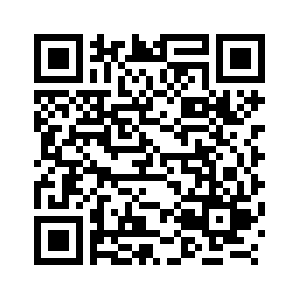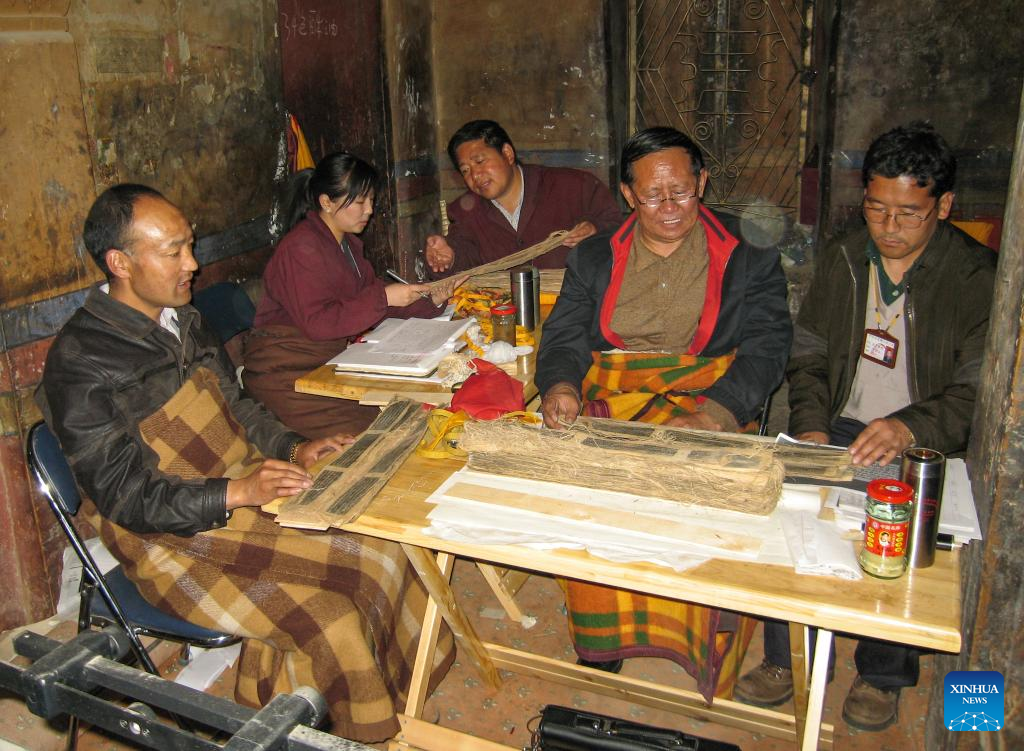
This file photo taken on May 12, 2008 shows Gyumey Tsultrim (1st L) arranging palm-leaf manuscripts of Buddhist sutras at Potala Palace in Lhasa, southwest China's Tibet Autonomous Region. At Truzing Palace of Norbulingka in the western suburbs of Lhasa, thousands of ancient books on various fields of Tibet are stored on shelves. For now, Gyumey Tsultrim and his colleagues' primary task is to make an inventory of the ancient books both manually and digitally.
Gyumey Tsultrim was born in 1967 in Chanang County in Shannan. In 1986, while experts from the Academy of Social Sciences of the Tibet Autonomous Region were conducting historical and cultural research in Chanang, Gyumey Tsultrim, working as an assistant in Tibetan language, was exposed to Sanskrit for the first time. In 1991, he went to the High-level Tibetan Buddhism College of China in Beijing to study Sanskrit systematically.
In 2006, Gyumey Tsultrim published a book on Sanskrit handwriting and began participating in the protection of the palm-leaf manuscripts of Buddhist sutras, mainly responsible for repairing the damaged sutras. Palm-leaf manuscripts are mostly written in Sanskrit, and they feature ancient records of culture, philosophy, history, and sciences in South and Central Asia. Tibet is home to numerous important palm-leaf manuscripts.
Over the next six years, Gyumey Tsultrim and other experts carried out comprehensive research in Tibet based on records of palm-leaf manuscripts of Buddhist sutras in the literature.
After completing the survey and restoration of palm-leaf manuscripts, he continued to work on the restoration of ancient Tibetan books and documents. In 2017, Gyumey Tsultrim was awarded the title of "Tibetan Craftsman." (Xinhua)
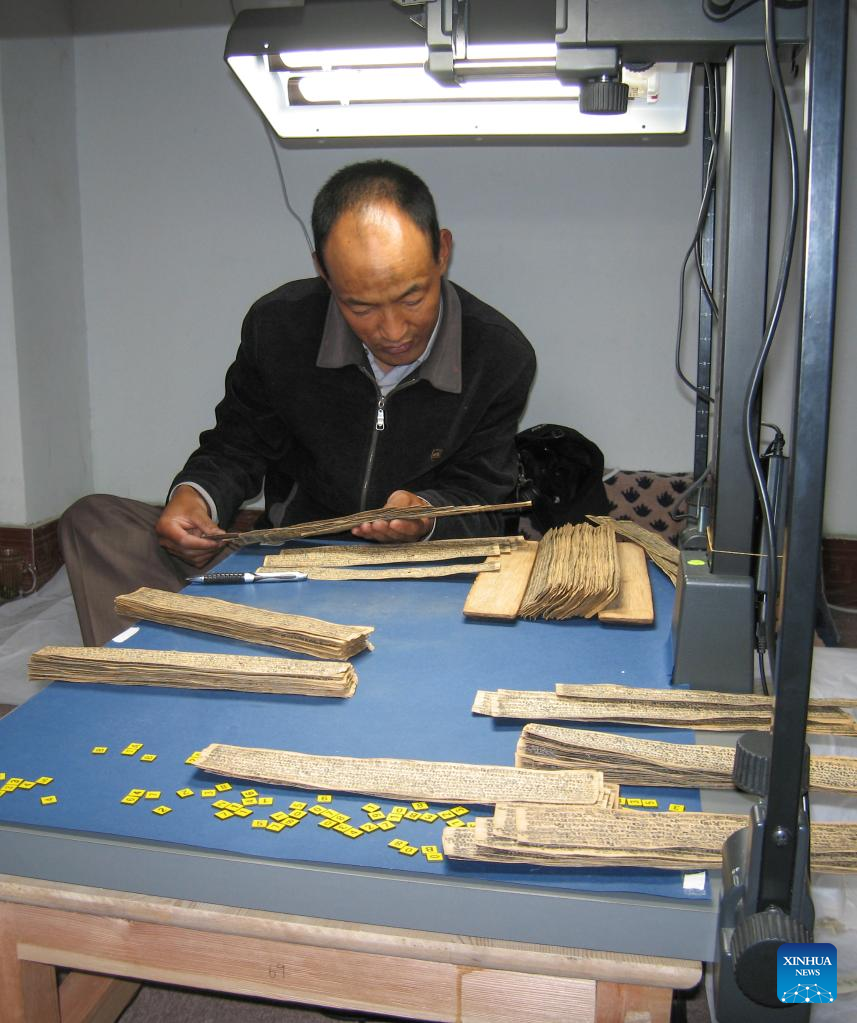
This file photo taken on June 26, 2008 shows Gyumey Tsultrim arranging palm-leaf manuscripts of Buddhist sutras at Tibet Museum in Lhasa, southwest China's Tibet Autonomous Region. At Truzing Palace of Norbulingka in the western suburbs of Lhasa, thousands of ancient books on various fields of Tibet are stored on shelves. For now, Gyumey Tsultrim and his colleagues' primary task is to make an inventory of the ancient books both manually and digitally.
Gyumey Tsultrim was born in 1967 in Chanang County in Shannan. In 1986, while experts from the Academy of Social Sciences of the Tibet Autonomous Region were conducting historical and cultural research in Chanang, Gyumey Tsultrim, working as an assistant in Tibetan language, was exposed to Sanskrit for the first time. In 1991, he went to the High-level Tibetan Buddhism College of China in Beijing to study Sanskrit systematically.
In 2006, Gyumey Tsultrim published a book on Sanskrit handwriting and began participating in the protection of the palm-leaf manuscripts of Buddhist sutras, mainly responsible for repairing the damaged sutras. Palm-leaf manuscripts are mostly written in Sanskrit, and they feature ancient records of culture, philosophy, history, and sciences in South and Central Asia. Tibet is home to numerous important palm-leaf manuscripts.
Over the next six years, Gyumey Tsultrim and other experts carried out comprehensive research in Tibet based on records of palm-leaf manuscripts of Buddhist sutras in the literature.
After completing the survey and restoration of palm-leaf manuscripts, he continued to work on the restoration of ancient Tibetan books and documents. In 2017, Gyumey Tsultrim was awarded the title of "Tibetan Craftsman." (Xinhua)
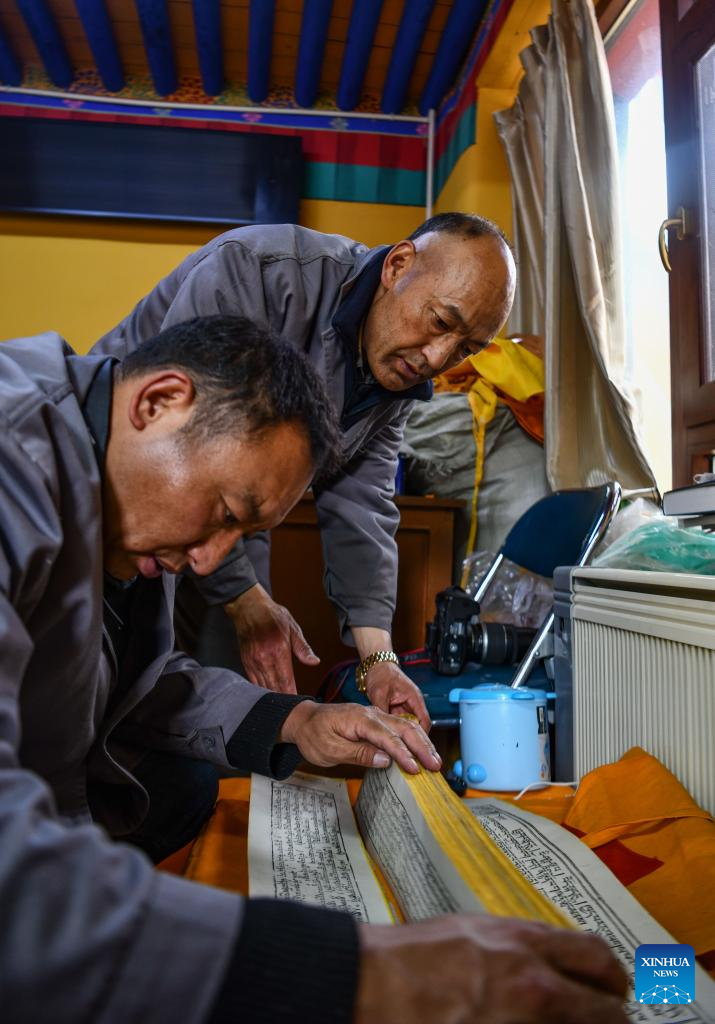
Gyumey Tsultrim (back) and his colleague make an inventory of ancient books in Lhasa, southwest China's Tibet Autonomous Region, April 19, 2023. At Truzing Palace of Norbulingka in the western suburbs of Lhasa, thousands of ancient books on various fields of Tibet are stored on shelves. For now, Gyumey Tsultrim and his colleagues' primary task is to make an inventory of the ancient books both manually and digitally.
Gyumey Tsultrim was born in 1967 in Chanang County in Shannan. In 1986, while experts from the Academy of Social Sciences of the Tibet Autonomous Region were conducting historical and cultural research in Chanang, Gyumey Tsultrim, working as an assistant in Tibetan language, was exposed to Sanskrit for the first time. In 1991, he went to the High-level Tibetan Buddhism College of China in Beijing to study Sanskrit systematically.
In 2006, Gyumey Tsultrim published a book on Sanskrit handwriting and began participating in the protection of the palm-leaf manuscripts of Buddhist sutras, mainly responsible for repairing the damaged sutras. Palm-leaf manuscripts are mostly written in Sanskrit, and they feature ancient records of culture, philosophy, history, and sciences in South and Central Asia. Tibet is home to numerous important palm-leaf manuscripts.
Over the next six years, Gyumey Tsultrim and other experts carried out comprehensive research in Tibet based on records of palm-leaf manuscripts of Buddhist sutras in the literature.
After completing the survey and restoration of palm-leaf manuscripts, he continued to work on the restoration of ancient Tibetan books and documents. In 2017, Gyumey Tsultrim was awarded the title of "Tibetan Craftsman." (Xinhua/Liu Zhoupeng)
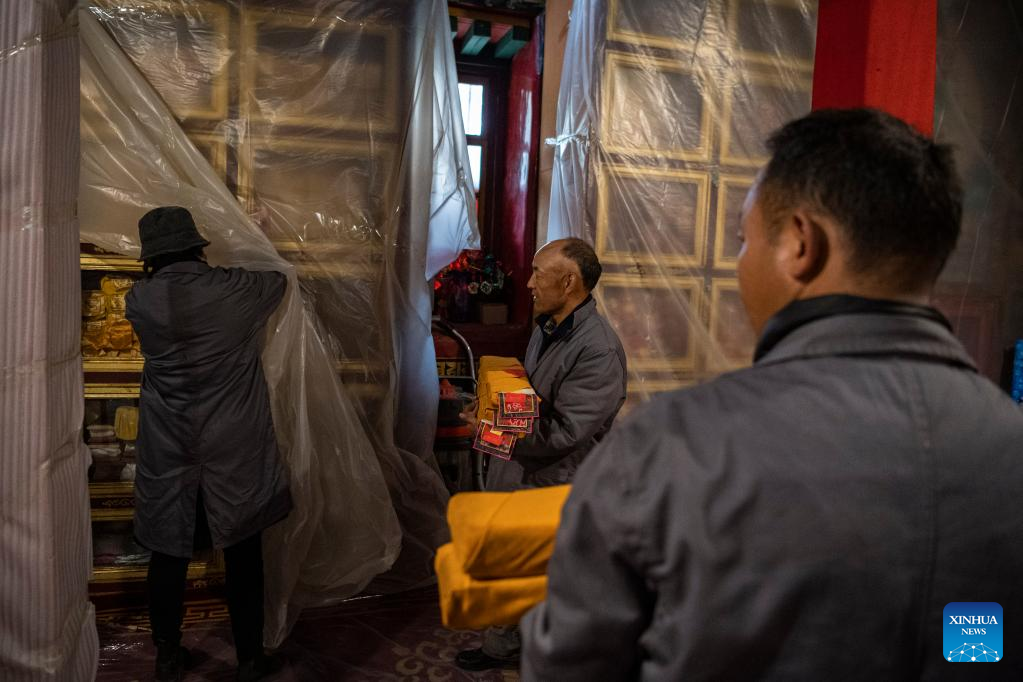
Gyumey Tsultrim (C) and colleagues collect ancient books before making an inventory of them in Lhasa, southwest China's Tibet Autonomous Region, April 19, 2023. At Truzing Palace of Norbulingka in the western suburbs of Lhasa, thousands of ancient books on various fields of Tibet are stored on shelves. For now, Gyumey Tsultrim and his colleagues' primary task is to make an inventory of the ancient books both manually and digitally.
Gyumey Tsultrim was born in 1967 in Chanang County in Shannan. In 1986, while experts from the Academy of Social Sciences of the Tibet Autonomous Region were conducting historical and cultural research in Chanang, Gyumey Tsultrim, working as an assistant in Tibetan language, was exposed to Sanskrit for the first time. In 1991, he went to the High-level Tibetan Buddhism College of China in Beijing to study Sanskrit systematically.
In 2006, Gyumey Tsultrim published a book on Sanskrit handwriting and began participating in the protection of the palm-leaf manuscripts of Buddhist sutras, mainly responsible for repairing the damaged sutras. Palm-leaf manuscripts are mostly written in Sanskrit, and they feature ancient records of culture, philosophy, history, and sciences in South and Central Asia. Tibet is home to numerous important palm-leaf manuscripts.
Over the next six years, Gyumey Tsultrim and other experts carried out comprehensive research in Tibet based on records of palm-leaf manuscripts of Buddhist sutras in the literature.
After completing the survey and restoration of palm-leaf manuscripts, he continued to work on the restoration of ancient Tibetan books and documents. In 2017, Gyumey Tsultrim was awarded the title of "Tibetan Craftsman." (Xinhua/Sun Fei)
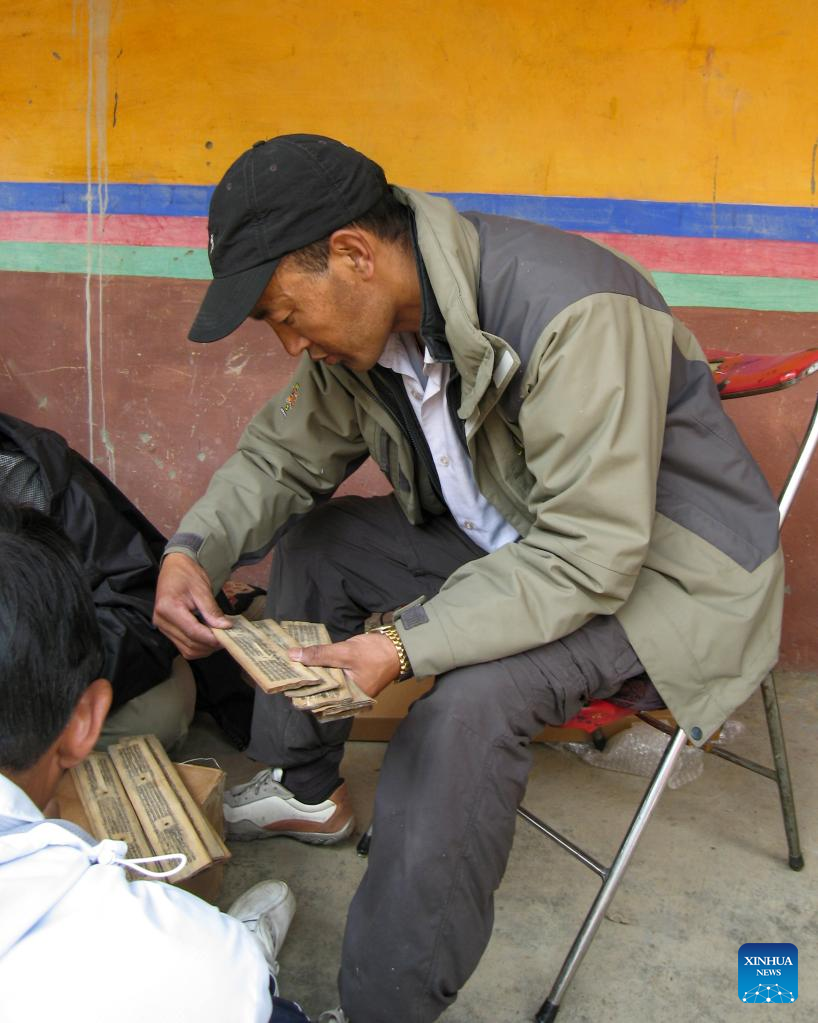
This file photo taken on July 27, 2008 shows Gyumey Tsultrim observing palm-leaf manuscripts of Buddhist sutras in southwest China's Tibet Autonomous Region. At Truzing Palace of Norbulingka in the western suburbs of Lhasa, thousands of ancient books on various fields of Tibet are stored on shelves. For now, Gyumey Tsultrim and his colleagues' primary task is to make an inventory of the ancient books both manually and digitally.
Gyumey Tsultrim was born in 1967 in Chanang County in Shannan. In 1986, while experts from the Academy of Social Sciences of the Tibet Autonomous Region were conducting historical and cultural research in Chanang, Gyumey Tsultrim, working as an assistant in Tibetan language, was exposed to Sanskrit for the first time. In 1991, he went to the High-level Tibetan Buddhism College of China in Beijing to study Sanskrit systematically.
In 2006, Gyumey Tsultrim published a book on Sanskrit handwriting and began participating in the protection of the palm-leaf manuscripts of Buddhist sutras, mainly responsible for repairing the damaged sutras. Palm-leaf manuscripts are mostly written in Sanskrit, and they feature ancient records of culture, philosophy, history, and sciences in South and Central Asia. Tibet is home to numerous important palm-leaf manuscripts.
Over the next six years, Gyumey Tsultrim and other experts carried out comprehensive research in Tibet based on records of palm-leaf manuscripts of Buddhist sutras in the literature.
After completing the survey and restoration of palm-leaf manuscripts, he continued to work on the restoration of ancient Tibetan books and documents. In 2017, Gyumey Tsultrim was awarded the title of "Tibetan Craftsman." (Xinhua)
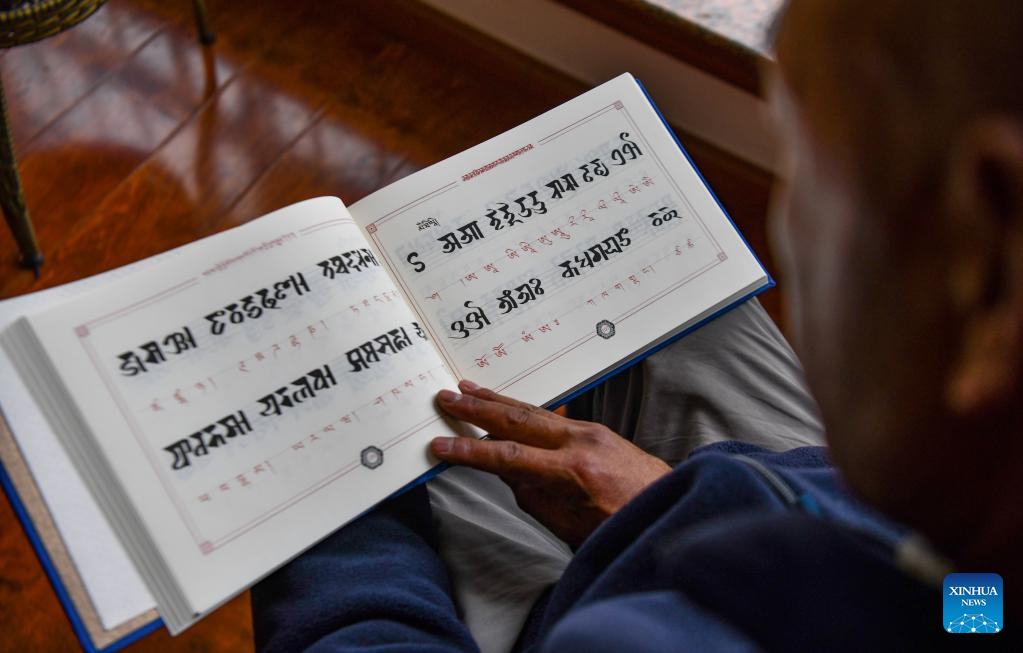
Gyumey Tsultrim checks a reference book in Sanskrit and Tibetan in Lhasa, southwest China's Tibet Autonomous Region, April 19, 2023. At Truzing Palace of Norbulingka in the western suburbs of Lhasa, thousands of ancient books on various fields of Tibet are stored on shelves. For now, Gyumey Tsultrim and his colleagues' primary task is to make an inventory of the ancient books both manually and digitally.
Gyumey Tsultrim was born in 1967 in Chanang County in Shannan. In 1986, while experts from the Academy of Social Sciences of the Tibet Autonomous Region were conducting historical and cultural research in Chanang, Gyumey Tsultrim, working as an assistant in Tibetan language, was exposed to Sanskrit for the first time. In 1991, he went to the High-level Tibetan Buddhism College of China in Beijing to study Sanskrit systematically.
In 2006, Gyumey Tsultrim published a book on Sanskrit handwriting and began participating in the protection of the palm-leaf manuscripts of Buddhist sutras, mainly responsible for repairing the damaged sutras. Palm-leaf manuscripts are mostly written in Sanskrit, and they feature ancient records of culture, philosophy, history, and sciences in South and Central Asia. Tibet is home to numerous important palm-leaf manuscripts.
Over the next six years, Gyumey Tsultrim and other experts carried out comprehensive research in Tibet based on records of palm-leaf manuscripts of Buddhist sutras in the literature.
After completing the survey and restoration of palm-leaf manuscripts, he continued to work on the restoration of ancient Tibetan books and documents. In 2017, Gyumey Tsultrim was awarded the title of "Tibetan Craftsman." (Xinhua/Jigme Dorje)
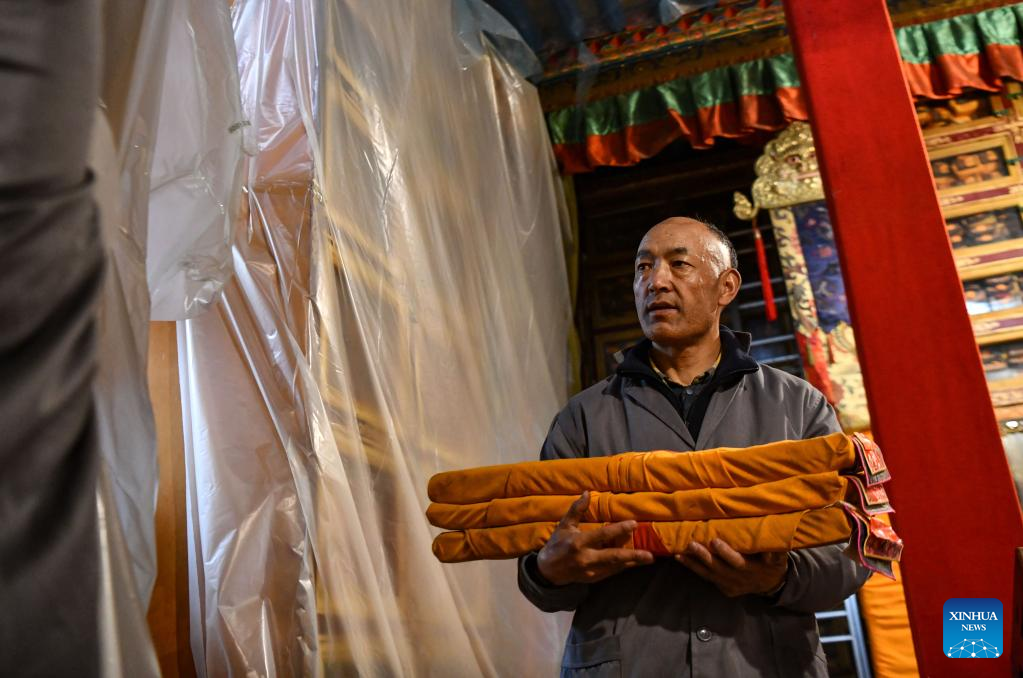
Gyumey Tsultrim carries ancient books before making an inventory of them in Lhasa, southwest China's Tibet Autonomous Region, April 19, 2023. At Truzing Palace of Norbulingka in the western suburbs of Lhasa, thousands of ancient books on various fields of Tibet are stored on shelves. For now, Gyumey Tsultrim and his colleagues' primary task is to make an inventory of the ancient books both manually and digitally.
Gyumey Tsultrim was born in 1967 in Chanang County in Shannan. In 1986, while experts from the Academy of Social Sciences of the Tibet Autonomous Region were conducting historical and cultural research in Chanang, Gyumey Tsultrim, working as an assistant in Tibetan language, was exposed to Sanskrit for the first time. In 1991, he went to the High-level Tibetan Buddhism College of China in Beijing to study Sanskrit systematically.
In 2006, Gyumey Tsultrim published a book on Sanskrit handwriting and began participating in the protection of the palm-leaf manuscripts of Buddhist sutras, mainly responsible for repairing the damaged sutras. Palm-leaf manuscripts are mostly written in Sanskrit, and they feature ancient records of culture, philosophy, history, and sciences in South and Central Asia. Tibet is home to numerous important palm-leaf manuscripts.
Over the next six years, Gyumey Tsultrim and other experts carried out comprehensive research in Tibet based on records of palm-leaf manuscripts of Buddhist sutras in the literature.
After completing the survey and restoration of palm-leaf manuscripts, he continued to work on the restoration of ancient Tibetan books and documents. In 2017, Gyumey Tsultrim was awarded the title of "Tibetan Craftsman." (Xinhua/Jigme Dorje)
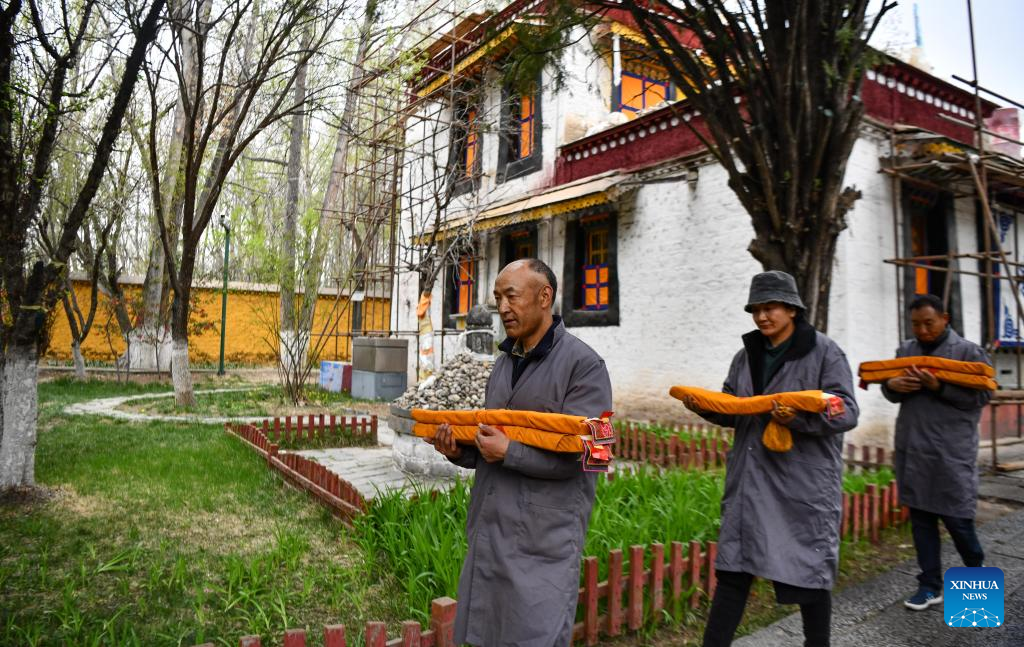
Gyumey Tsultrim (1st L) and his colleagues collect ancient books before making an inventory of them in Lhasa, southwest China's Tibet Autonomous Region, April 19, 2023. At Truzing Palace of Norbulingka in the western suburbs of Lhasa, thousands of ancient books on various fields of Tibet are stored on shelves. For now, Gyumey Tsultrim and his colleagues' primary task is to make an inventory of the ancient books both manually and digitally.
Gyumey Tsultrim was born in 1967 in Chanang County in Shannan. In 1986, while experts from the Academy of Social Sciences of the Tibet Autonomous Region were conducting historical and cultural research in Chanang, Gyumey Tsultrim, working as an assistant in Tibetan language, was exposed to Sanskrit for the first time. In 1991, he went to the High-level Tibetan Buddhism College of China in Beijing to study Sanskrit systematically.
In 2006, Gyumey Tsultrim published a book on Sanskrit handwriting and began participating in the protection of the palm-leaf manuscripts of Buddhist sutras, mainly responsible for repairing the damaged sutras. Palm-leaf manuscripts are mostly written in Sanskrit, and they feature ancient records of culture, philosophy, history, and sciences in South and Central Asia. Tibet is home to numerous important palm-leaf manuscripts.
Over the next six years, Gyumey Tsultrim and other experts carried out comprehensive research in Tibet based on records of palm-leaf manuscripts of Buddhist sutras in the literature.
After completing the survey and restoration of palm-leaf manuscripts, he continued to work on the restoration of ancient Tibetan books and documents. In 2017, Gyumey Tsultrim was awarded the title of "Tibetan Craftsman." (Xinhua/Jigme Dorje)
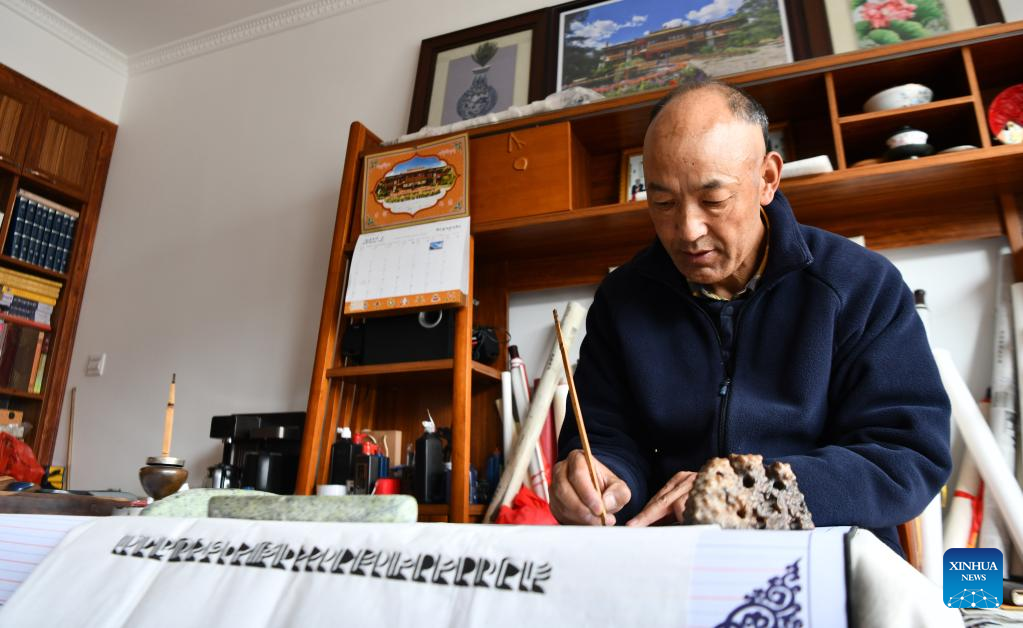
Gyumey Tsultrim writes Sanskrit calligraphy at home in Lhasa, southwest China's Tibet Autonomous Region, April 19, 2023. At Truzing Palace of Norbulingka in the western suburbs of Lhasa, thousands of ancient books on various fields of Tibet are stored on shelves. For now, Gyumey Tsultrim and his colleagues' primary task is to make an inventory of the ancient books both manually and digitally.
Gyumey Tsultrim was born in 1967 in Chanang County in Shannan. In 1986, while experts from the Academy of Social Sciences of the Tibet Autonomous Region were conducting historical and cultural research in Chanang, Gyumey Tsultrim, working as an assistant in Tibetan language, was exposed to Sanskrit for the first time. In 1991, he went to the High-level Tibetan Buddhism College of China in Beijing to study Sanskrit systematically.
In 2006, Gyumey Tsultrim published a book on Sanskrit handwriting and began participating in the protection of the palm-leaf manuscripts of Buddhist sutras, mainly responsible for repairing the damaged sutras. Palm-leaf manuscripts are mostly written in Sanskrit, and they feature ancient records of culture, philosophy, history, and sciences in South and Central Asia. Tibet is home to numerous important palm-leaf manuscripts.
Over the next six years, Gyumey Tsultrim and other experts carried out comprehensive research in Tibet based on records of palm-leaf manuscripts of Buddhist sutras in the literature.
After completing the survey and restoration of palm-leaf manuscripts, he continued to work on the restoration of ancient Tibetan books and documents. In 2017, Gyumey Tsultrim was awarded the title of "Tibetan Craftsman." (Xinhua/Jigme Dorje)
